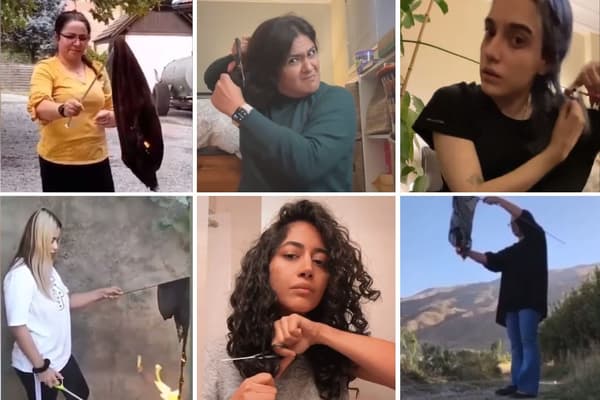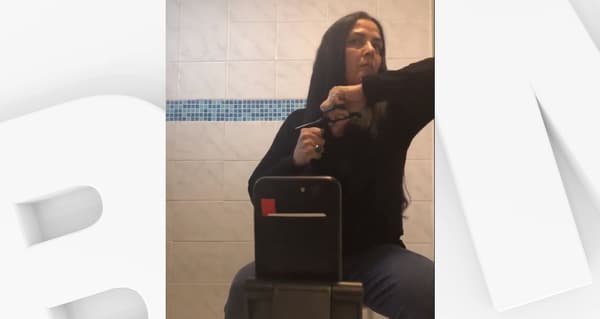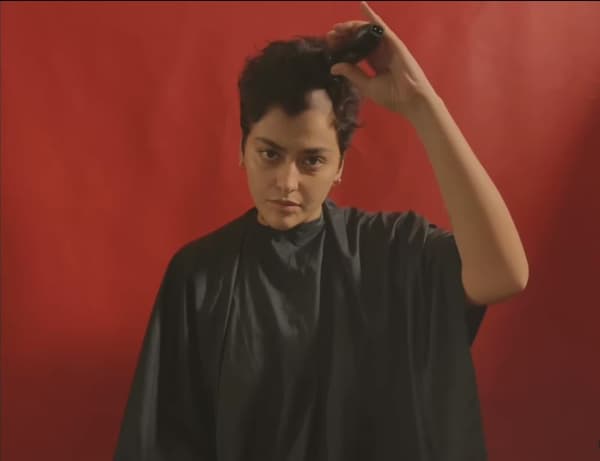From an early age, Masih Alinejad removed her hijab “secretly”, “like many women”. “Not in public, otherwise you risked arrest,” he explains. “I remember once I went to Lebanon, I was walking down the street without a veil and I had a panic attack when I ran into the police.”
“This is what this regime is doing to us: wherever they go, women are afraid,” summarizes this 45-year-old Iranian feminist activist, exiled in the United States.
Masih Alinejad has been fighting against the compulsory wearing of the hijab in Iran for decades. In fact, in the country, women are forced to cover their hair in public. The vice police, responsible for enforcing the Islamic Republic’s strict dress code, also forbids them from wearing coats above the knee, tight pants, jeans with holes, or brightly colored outfits.
“Women in Front of the Stage”
But in recent days, Iranian women are no longer hiding their anger over Mahsa Amini’s death. On September 16, the 22-year-old died after being arrested and beaten for “wearing inappropriate clothing” by the vice squad.
Since, the event sparked a wave of protests across the country, which killed at least 31 people according to an NGO report. Despite the repression, Iranian women demonstrate bareheaded, brandishing their veils, burning them or chanting the word “Freedom”.
“What is unprecedented in these demonstrations is that we find women at the forefront,” says Azadeh Kian, a sociology professor at Paris Cité University and a specialist in Iran, interviewed by AFP.
“It filled me with disgust and anger”
In support, many Iranian women in the diaspora film themselves burning their veils or cutting their hair as a sign of solidarity. This was done by the Iranian Narges Jalali, 53, in a video uploaded to Twitter a few days ago.
“It filled me with disgust and anger, so I thought the only thing in my power was to sit down and cut my hair,” this Iranian refugee woman in Sweden, where she has been a waitress for several years, told BFMTV today.
“The idea that in the 21st century we kill a girl because she is wearing a dress, it shocked me and I thought it could have happened to me,” he says.
“I put myself in Mahsa’s mother’s shoes,” explains Narges Jalali. “Now I live in a free country, but for 43 years I have seen women humiliated, beaten and imprisoned for the hijab. Many of us have been saying for years that we don’t want to use it anymore, but nobody listens to us! “

“Mahsa has become a symbol”
“Iranian women are furious (…) Mahsa has become a symbol of resistance against obscurantism and the Islamic dictatorship,” analyzes Masih Alinejad, who was forced to leave the country in 2009 for his criticism of the Islamic Republic of Iran. . The Iranian journalist now lives in exile in New York, from where she launched several protest movements to denounce the forced use of the hijab.
For her, “the death of Mahsa Amini had the effect of a trigger for Iranian women.” “We are at a turning point because many women identify with this young woman. They tell themselves that it could have happened to their own daughters: Mahsa was innocent, she did not participate in any demonstration. She combed her hair, and for that they killed her and beat her until death”.
“Iranian women have suffered this for 40 years! (…) We are in the 21st century! We no longer want to see our compatriots risk their lives to show a little hair,” says the feminist activist.

A few months ago, Iranian Reyhane Parsa, 23, also used her hair as a symbol of resistance. This young actress, considered the rising star of film and television in Iran, left the country for Turkey in 2020. The young woman had become a target of the regime for posting photos on Instagram of herself in a hijab deemed “too loose”.
From Istanbul, where she now lives far from her family, Reyhane Parsa later posted a video of herself on the social network. shave your head in defiance towards the regime. Another video of her shows her taking off her hijab, as she claims that she does not “violate the laws of the Islamic Republic as her hair is less than 2 centimeters”. Since then, the Iranian exile claims to be the subject of numerous pressures and threats from Iranian intelligence, including Turkey.
The life of Iranian women, “made of contradictions and paradoxes”
On the social network, the young woman explains that she did this “because of the suffering that being a woman represents even today”: “I dedicate this gesture to the anger and patience of all the women of the Middle East, we want freedom and are tired of their obscurantism “. A video that she chose to repost on Monday to support the protest movement that she has won in her home country.
“When I did it, I knew that hair was of the utmost importance to them (…) So I said to myself ‘if they are ready to kill me because I discovered my hair, then I better not have hair anymore!’”, said the young woman actress to BFMTV.com.

If Iranian women today are attacking the hijab, like her, it is because it represents “the most visible symbol of the oppression” of the Islamic Republic of Iran against them, says Masih Alinejad.
“What happened to Mahsa can happen to any woman in Iran at any time,” she said. Iranian women are receiving death threats every day, all the time, whether it’s from their family, society or the government.”
“Life in Iran is very difficult for women to live: it is made of many contradictions and paradoxes,” Reyhane Parsa abounds, expressing “her immense sadness” for the events that affect her country. “Suffering is in the genes of Iranian women. It is nothing new, we have been suffering for decades but despite everything, today we are full of hope and ready to fight”.
Reyhane, Narges or Masih… The Iranians interviewed call on the international community to “not close its eyes to what is happening” and to commit to ending the current regime in Iran. Amid the repression of the demonstrations, the meeting in New York between Emmanuel Macron and the Iranian ultra-conservative leader on Wednesday provoked a reaction in the country, although the French president claims to have informed his Iranian counterpart of the “shock that was his at the news of the death of Mahsa Amini after his arrest”.
Source: BFM TV

